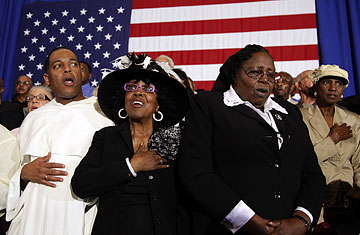
Members of the audience say the Pledge of Allegiance before President Barack Obama speaks at Xavier University of Louisiana in New Orleans on the fifth anniversary of Hurricane Katrina
The best of America was on display Sunday afternoon, at just the right time. A series of ceremonies commemorating the five-year anniversary of Hurricane Katrina showed everything that has been absent from the fight over plans to build an Islamic cultural center near Ground Zero in Manhattan was gloriously present along the Gulf Coast.
The two greatest national trials of the past decade — Sept. 11 and Katrina — are frequently and naturally linked. Both were unprecedented events that killed horrifying numbers of Americans, left vast and symbolic physical ruin, weakened the economy, damaged great cities and, most of all, struck at the heart of the nation's confidence and psychological security.
Unlike the former World Trade Center site, where almost nothing has been rebuilt, there has been a great deal of construction throughout the Gulf Coast, including New Orleans, where President Barack Obama was on hand to mark the anniversary, and on the Mississippi coast, where both tourism and the housing stock are coming back despite the additional harsh blow of the BP oil spill this past spring. The visual open wound in lower Manhattan has contributed to the shocking and divisive fight over whether to allow the Islamic center to be built. That battle, still raging and unresolved, has obscured many of the positive lessons and examples that came out of the aftermath of the 9/11 attacks.
Sunday's numerous commemorations were anchored by the President's speech at Xavier University of Louisiana in New Orleans and, shortly after, by an event called "Five Years Forward: A Celebration of Katrina Recovery" in Gulfport, Miss., featuring the Secretary of Homeland Security, Janet Napolitano, and the first couple of Mississippi, Governor Haley Barbour and his wife Marsha. Both ceremonies included politicians from each party sitting side by side, their partisanship checked at the door. Both included tributes to the three essential blessings of the hurricane: the resilience of the people in the storm's path, the selflessness of neighbors who cared for others and the extraordinary kindness of thousands of volunteers who streamed into the region from all over the country to lend assistance to their fellow Americans in need.
Marsha Barbour's leadership on the coast in the weeks after the storm while her husband spent time in Washington lining up federal assistance inspired warm gratitude in the ceremony, and she nearly broke down in tears as she thanked the volunteers and organizations whose outpourings of generosity counteracted the ravages of the storm. A multiracial audience listened raptly as Governor Barbour told a tale of a rabbi from New York who encouraged his father to continue his volunteer work in Mississippi during the Jewish high holidays as a finer tribute to "God's grace."
The Sunday celebrations around the Gulf were a reminder that unity, diversity and strength form the core of our country, and that our leaders, Obama especially, must encourage the nation to address our biggest challenges together. This was a lesson learned after Sept. 11, 2001, but has since been too often forgotten.
The legacy of Katrina, said the President, must be "not one of neglect, but of action; not one of indifference, but of empathy; not of abandonment, but of a community working together to meet shared challenges." Political leaders and citizens alike should take those words to heart when times get tough and when issues threaten to divide us.
